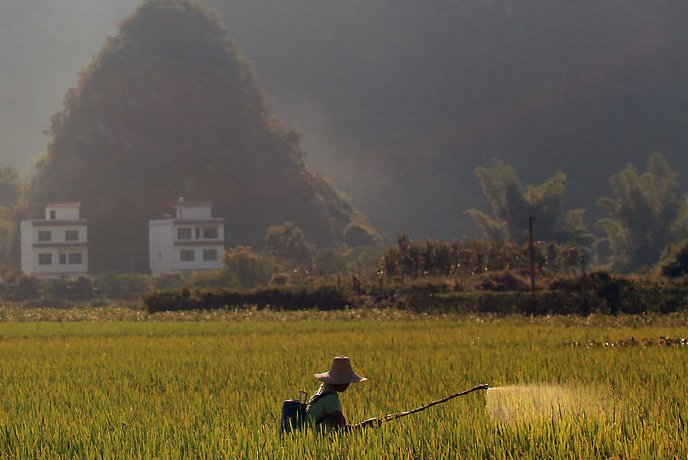New research shows an ingredient in the pesticide Roundup can increase cancer risk by 41 percent. Pictured, a Chinese farmer sprays pesticide on a field of rice in Yangshuo, a city in Guangxi Zhuang Autonomous Region on October 8, 2011. File Photo by Stephen Shaver/UPI |
License Photo
Feb. 15 (UPI) -- Glyphosate, a chemical in the popular weedkiller Roundup, may elevate cancer risk in people, according to a new study.
Researchers examined studies conducted between 2001 and 2018 and found that the chemical could increase the risk of Non-Hodgkin Lymphoma by up to more than 41 percent, according to new findings published this month in Science Direct.
"Our analysis focused on providing the best possible answer to the question of whether or not glyphosate is carcinogenic," senior author Lianne Sheppard, a professor at the University of Washingtonsaid in a press release. "As a result of this research, I am even more convinced that it is."
This new study contradicts a past report from the European Food Safety Authority that said glyphosate does not cause cancer.
The United Nations doubled down on the claim, declaring that glyphosate was unlikely to cause cancer.
Still, Roundup's main chemical remained on the radar as a dangerous substance in the United States. California listed glyphosate as a carcinogen, along with 800 other toxic chemicals.
The current study's researchers say past studies could have excluded any analysis of increased exposures from "green burndown," which occurs when herbicides that contain glyphosate are sprayed onto crops right before harvest.
"This research provides the most up-to-date analysis of glyphosate and its link with Non-Hodgkin Lymphoma, incorporating a 2018 study of more than 54,000 people who work as licensed pesticide applicators," said co-author Rachel Shaffer, a study author and researcher at UW.
And today's crops are likely to have a larger amount of glyphosate residue than when the chemical was introduced in 1974, researchers say.
"These findings are aligned with a prior assessment from the International Agency for Research on Cancer, which classified glyphosate as a 'probable human carcinogen' in 2015," Shaffer said.















